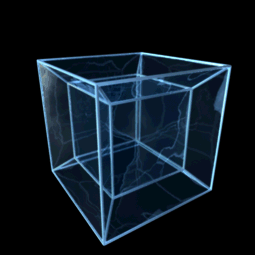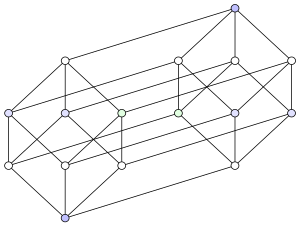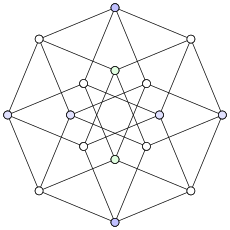Teserakt: Porovnání verzí
Smazaný obsah Přidaný obsah
Bez shrnutí editace |
|||
| Řádek 59: | Řádek 59: | ||
[[Soubor:Hypercubecentral.svg|220px]] |
[[Soubor:Hypercubecentral.svg|220px]] |
||
|} |
|} |
||
{{polychora}} |
|||
{| class="wikitable" |
|||
|- |
|||
! VÍCEROZMĚRNÁ GEOMETRICKÁ TĚLESA |
|||
|- |
|||
| d=2 || [[trojúhelník]] || [[čtverec]] || [[šestiúhelník]] || [[pětiúhelník]] |
|||
|- |
|||
| d=3 || [[jehlan]] || [[krychle]], [[oktaedr]] || [[krychloktaedr]],[[kosočtevečný dvanáctistěn]] ||[[dvanáctistěn]] , [[dvacetistěn]] |
|||
|- |
|||
| d=4|| [[5-nadstěn]] || [[ teserakt]], [[16-nadstěn]] || [[24-nadstěn]]|| [[120-nadstěn]],[[600-nadstěn]] |
|||
|- |
|||
| d=5 || [[5-simplex]]|| [[penterakt]], [[5-ortoplex]] |
|||
|- |
|||
| d=6 || [[6-simplex]] || [[hexerakt]], [[6-ortoplex]] |
|||
|- |
|||
| d=7 || [[7-simplex]]|| [[hepterakt]], [[7-ortoplex]] |
|||
|- |
|||
| d=8 || [[8-simplex]]|| [[okterakt]] , [[8-ortoplex]] |
|||
|- |
|||
| d=9 || [[9-simplex]]|| [[ennerakt]] , [[9-ortoplex]] |
|||
|- |
|||
| d=10 || [[10-simplex]]|| [[dekerakt]] , [[10-ortoplex]] |
|||
|- |
|||
| d=11 || [[11-simplex]]|| [[hendekerakt]] , [[11-ortoplex]] |
|||
|- |
|||
| d=12 || [[12-simplex]]|| [[dodekerakt]] , [[12-ortoplex]] |
|||
|- |
|||
| d=13 || [[13-simplex]]|| [[triskaidekerakt]] , [[13-ortoplex]] |
|||
|- |
|||
| d=14 || [[14-simplex]]|| [[tetradekerakt]] , [[14-ortoplex]] |
|||
|- |
|||
| d=15 || [[15-simplex]]|| [[pentadekerakt]] , [[15-ortoplex]] |
|||
|- |
|||
| d=16 || [[16-simplex]]|| [[hexadekerakt]] , [[16-ortoplex]] |
|||
|- |
|||
| d=17 || [[17-simplex]]|| [[heptadekerakt]] , [[17-ortoplex]] |
|||
|- |
|||
| d=18 || [[18-simplex]]|| [[oktadekerakt]] , [[18-ortoplex]] |
|||
|- |
|||
| d=19 || [[19-simplex]]|| [[ennedekerakt]] , [[19-ortoplex]] |
|||
|- |
|||
| d=20 || [[20-simplex]]|| [[ikosarakt]] , [[20-ortoplex]] |
|||
|} |
|||
== Externí odkazy == |
== Externí odkazy == |
||
Verze z 29. 1. 2012, 14:48
| Teserakt (8-nadstěn) | |
|---|---|

| |
| Typ | Pravidelný polychoron |
| Nadstěn | 8 (4.4.4) |
| Stěn | 24 {4} |
| Hran | 32 |
| Vrcholů | 16 |
| Uspořádání vrcholů | 4 (4.4.4) (tetraedr) |
| Schläfliho symbol | {4,3,3} |
| Grupa symetrie | grupa [3,3,4] |
| Duální těleso | 16-nadstěn |
| Vlastnosti | konvexní |
V geometrii je teserakt čtyřrozměrnou analogií krychle, jde tedy o speciální variantu nadkrychle pro d=4. Více odborně by mohl být teserakt definován jako pravidelný konvexní čtyřúhelník s osmi krychlovými nadstěnami. Předpokládá se, že slovo teserakt vymyslel Charles Howard Hinton.
Geometrie
Standardní teserakt je v Euklidovském 4prostoru dán jako konvexní plášť bodů (±1, ±1, ±1, ±1).
Objem a obsah teseraktu
Následující vzorce udávají, jaký je objem teseraktu, a jeho k-rozměrné povrchy (což je vždy obsah k-rozměrné stěny krát počet těchto stěn) v závislosti na hraně a.[1]
Poloměr vepsané koule je
a poloměr koule opsané je
 |
 |

|
| Vícerozměrná geometrická tělesa | ||||
|---|---|---|---|---|
| d=2 | trojúhelník | čtverec | šestiúhelník | pětiúhelník |
| d=3 | tetraedr | krychle, oktaedr | krychloktaedr, kosočtverečný dvanáctistěn | dvanáctistěn, dvacetistěn |
| d=4 | 5nadstěn | teserakt, 16nadstěn | 24nadstěn | 120nadstěn, 600nadstěn |
| d=5 | 5simplex | penterakt, 5ortoplex | ||
| d=6 | 6simplex | hexerakt, 6ortoplex | ||
| d=7 | 7simplex | hepterakt, 7ortoplex | ||
| d=8 | 8simplex | okterakt, 8ortoplex | ||
| d=9 | 9simplex | ennerakt, 9ortoplex | ||
| d=10 | 10simplex | dekerakt, 10ortoplex | ||
| d=11 | 11simplex | hendekerakt, 11ortoplex | ||
| d=12 | 12simplex | dodekerakt, 12ortoplex | ||
| d=13 | 13simplex | triskaidekerakt, 13ortoplex | ||
| d=14 | 14simplex | tetradekerakt, 14ortoplex | ||
| d=15 | 15simplex | pentadekerakt, 15ortoplex | ||
| d=16 | 16simplex | hexadekerakt, 16ortoplex | ||
| d=17 | 17simplex | heptadekerakt, 17ortoplex | ||
| d=18 | 18simplex | oktadekerakt, 18ortoplex | ||
| d=19 | 19simplex | ennedekerakt, 19ortoplex | ||
| d=20 | 20simplex | ikosarakt, 20ortoplex | ||
Externí odkazy
- HyperSolids je open source program pro Macintosh (Mac OS X a vyšší).
- Hypercube 98 Program pro Windows zobrazující animovanou 4D hyperkrychli vytvořený Rudy Ruckerem.
Reference
- ↑ FONTAINE, David A. Dostupné online. (anglicky)







